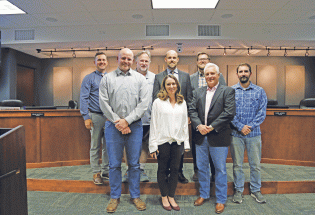New playground equipment ordered for Bein Park
By Rudy Hemmann
The Surveyor
Tuesday evening’s meeting of the town trustees began an hour early to allow the elected officials, along with town staff, to host an open house for a public “meet and greet.” The event was lightly attended with several trustees and staffers either being out of town or opting to forego attendance. The open house, which was held at the second-floor conference room, retired to the board room after approximately 45 minutes.
The trustees took no action on a potential ordinance establishing a Work Permit Program and a Replacement Program for the town’s street trees. Town Administrator Chris Kirk reported the ordinance was not yet complete due to questions raised internally and by the public. Kirk recommended discussion and action if the item be postponed until staff could vet issues concerning the proposal. The trustees complied with his request and the issue was postponed until the Tuesday, June 11, 2019, meeting.

The board considered a proposal from the Parks and Recreation Department concerning the recommendation from the department to award a contract for Bein Park playground equipment replacement to the highest bidder. Jeremy Olinger, director of Parks and Recreation, informed the board the department had requested bids for replacement of the existing equipment, which has been in existence for over 20 years, in April. Four companies bid on the job.
The four companies and their bid totals are A to Z Equipment, $66,910; Recreation Plus, $79,814; Star Playgrounds, $79,984; and Churchich Recreation, $80,000.
Olinger noted while Churchich may be the high bidder, the quality of the equipment and the number of items which the proposal by them outstripped the competition.
Following a brief period of discussion by the trustees a motion to award the Bein Playground equipment project to Churchich Recreation, LLC, and authorize the town administrator to authorize any necessary change orders up to a maximum of five percent of the proposed project cost, was made, seconded and passed unanimously.
The trustees heard a lengthy presentation by Alan Pogue of the law firm Icenogle, Seaver and Pogue regarding items which the trustees may wish to consider in their quest to develop standardized service plans for metropolitan (metro) districts. (Service plans are the guiding documents for metro districts. While they are considered governing agencies, they must have the approval of the local municipality to operate.) Pogue was clear in his presentation that the board should steer clear of “one size fits all” approach for a standardized, or model, service plans. He stressed each development that comes before the board to request approval of a service plan would be different and should be treated as such.
Other topics addressed by Pogue included:
A matrix, or spreadsheet, which compares the service plan policies for several municipalities near Berthoud was presented by Pogue for reference by the board.
The following points are from a document provided by Pogue:
Gallagher Adjustment – “The Gallagher Amendment to the Colorado Constitution divided the state’s total property tax burden between residential and commercial property. As a result of the Gallagher Amendment, 45 percent of the total amount of state property tax collected must come from residential property, and the remaining 55 percent must come from commercial property. In addition, the Gallagher Amendment fixed the assessment rate for commercial property at 29 percent, while the residential assessment rate is annually adjusted to maintain the 45/55 split between residential and commercial property. The assessment rate is the percentage of the property’s actual value that is taxed.
As a result of the increasing residential property values since the adoption of the Gallagher Amendment, the assessment rate for residential property has decreased substantially to maintain the constitutional ratio of 45/55. The mill levy imposed by a special district is a property tax based on the dollars per thousand of assessed value. Consequently, if the assessed value of a property declines, the amount of revenue collected by the special district pursuant to its mill levy declines.”
Disclosure Notice – “Most municipalities include a provision in the service plan that requires a written disclosure notice to be provided to potential purchasers of property located within the boundaries of the special district. The typical disclosure notice would include information regarding the maximum mill levy that could be imposed, as well as a general description of the district’s authority to impose and collect rates, fees, tolls and charges. This obligation to provide a written disclosure notice should be imposed on the developer, as opposed to the district. In our experience, the best way to ensure that the written disclosure notice is provided to potential purchasers of property within the district is for the jurisdiction to require the developer to enter into a written agreement as part of the service plan approval process obliging the developer to provide the written notice.”
Financial Advisor – “The applicant seeking approval of a service plan should be required to pay all costs and expenses incurred by the Town in the process of reviewing the service plan. The Town currently requires an applicant to reimburse the Town for the expense of outside legal counsel reviewing the service plan and providing advice to the Board in connection with its consideration of a proposed service plan. In addition to retaining legal counsel, we recommend that the Town retain an independent third-party financial adviser to review the financial plan required by state statute.”
Following the presentation by Pogue and several questions from the trustees, town staff was tasked with pulling together the information gleaned into a “model service plan” which the board could address at a future meeting.
- December, 09 2021

Health officials urge residents to se...
The Larimer County Department of Health and Environment (LCDHE) urges residents who have symptoms of...
- August, 14 2020

Homestead Gallery launches bi-monthly...
Courtesy photoJim Fronapfel, a Berthoud artist, holds up one of his pastel portraits, “A Taste...
- September, 27 2019

ECD Metalworks relocates from Denver ...
Courtesy photo - Emmett Culligan, founder and owner of ECD Metalworks, works Sept. 11 in...
- April, 01 2022

Town of Berthoud enters into an agree...
At last week's Coffee with a Cop Sergeant Jim Anderson introduced Joe Quinn, a sergeant...
- June, 17 2021

Taco Man brings food truck to Berthoud
Courtesy photo - Chris and Brenda Burke attract the crowds when...
- June, 19 2014

Work ’em Cowboy
Local fitness trainer "Cowboy Ryan" introduces Berthoud to unique workout program By May Soricelli The...

Unified basketball comes to Turner Middle School
Community News

Mike Grace says goodbye as Brett Wing joins town board
Community News
POLICEBLOTTER
Community News
Northern Water sets C-BT quota at 70% for 2024
Community News

Emotions run high during Revere Property hearing
Community News
Snowpack at 119% above normal
Community News

Karspeck to serve third term as Berthoud mayor
Community News
COMMUNITY CALENDAR:
Community Calendar – add an event
Homestead Fine Art Gallery First Fridays OPEN HOUSE
03 May 4:00 PM - 7:00 PM
Homestead Fine Art Gallery First Fridays OPEN HOUSE
07 Jun 4:00 PM - 7:00 PM
Homestead Fine Art Gallery First Fridays OPEN HOUSE
05 Jul 4:00 PM - 7:00 PM
Homestead Fine Art Gallery First Fridays OPEN HOUSE
02 Aug 4:00 PM - 7:00 PM
Homestead Fine Art Gallery First Fridays OPEN HOUSE
06 Sep 4:00 PM - 7:00 PM
Homestead Fine Art Gallery First Fridays OPEN HOUSE
04 Oct 4:00 PM - 7:00 PM





